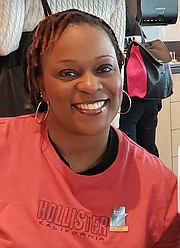Educator Jessica Kelly says all segments of the community should support teachers. Their work is hard and, too often, thankless. Photo by Green Chameleon on Unsplash
I am one of four daughters who descends from a very long line of ancestral educators. They instilled in me that education is the rudiment to a forward-thinking life of exploration, self-discovery and financial stability.
Many people associate a career in education with years of formal schooling, studying long hours, assessments, grading scales, pass/fail standings, and nothing more. With this association, some people now see education as stressful, antiquated, unnecessary and a financial burden. But education is a life-long act of inquiring, sorting fact from fiction, uncovering and discovering new ways to innovate, cultivate and revolutionize ideas that have not yet been fully realized or even born.
Educators were once regarded as a means to intellectual enlightenment and community leaders. We were revered, honored, and met with community and parental assistance. Now, to be politically correct, I'll allow the readers to fill in the blank(s) as to how educators are regarded. But allow me to point you in the direction of incessant viral videos of violence against educators (on primary and secondary levels) and the daily unremitting world news reports of mental-health issues of our young people (both treated and untreated).
Communities will show up, and rightfully so, to condemn the fatal violence our young people commit against one another, but never speak to the empty seats at public forums that seek the community's input in moving the community forward through the development of its youth.
Educators make the invaluable sacrifice of time with their own children, husbands, wives, and family to educate, encourage, parent, doctor, police, finance, advocate, love and enlighten the young lives we touch every single day.
Contrary to popular belief, being an educator does not end on Fridays. Being an educator does not end during holiday breaks and the summertime. Being an educator is a 365-day profession. We take these young people home with us in our minds, our hearts and our spirits.
We worry the most about those considered to be "the worst ones." We have anxiety about these gifts' lives. Our families feel that they know our students, because we talk about them so much. We seek to move them forward every day, not just in school, but in life. We celebrate the achievements of our students in a big way, because we know even seemingly minute milestones can be the difference in our students' success in life or their failure in life.
We worry about who is not feeding them, clothing them, encouraging and assisting them outside of school. Our hearts ache and bleed when they are abused, arrested, murdered and spiritually broken. We worry that no one is assisting us with teaching them how to put their feelings into perspective, that anger and violence should not be their initial reaction to everything. We worry that no one teaches them that they are at school to not only receive intellectual lessons, but also life lessons.
We are angered and experience extreme sadness when we hear parents/caregivers say out loud and in front of our students: "I don't have time for this," "I'm sick of you," "Your brothers and sisters don't give me these problems," "Don't call me about him/her anymore," "Call the police, don't call me." Imagine how they feel, internalize it, and take it out on themselves, their peers and their teachers.
Imagine if you were enduring this on a daily basis. We still have to go home to our families and be a fully engaged mommy or daddy, wife or husband, all while still worrying about lesson plans, interventions, observations, evaluations, audits, grading papers, individualized instruction and behavior plans.
So, what about us? Where is the help for the helpers? Who educates us on how to manage and instruct ODD (Oppositional Defiant Disorder), ADD (Attention Deficit Disorder), ADHD (Attention Deficit Hyperactivity Disorder), EMD (Emotionally Disturbed), TBI (Traumatic Brain Injury), DMDD (Disruptive Mood Dysregulation Disorder), adolescent anxiety and adolescent depression all in the same classroom?
Where are the businessmen and women who own businesses in our communities? They take our money, but don't invest their time in the very community that finances their livelihoods. Where are the dads, the ministers, the deacons, the uncles, the older brothers, the older male cousins and the grandfathers? Men, and male teachers, are vital due to the lack of positive male influence in the lives of many children in our communities.
We need all of you to seek to raise, understand and parent our children—not for the 30-second spotlight on the news, not for the social-media likes, not for the viral videos, but for the very existence all of our children. You are our help. Where are you? What about us?
Jessica L. Kelly teaches in Jackson Public Schools.
This essay does not necessarily reflect the views of the Jackson Free Press.




Comments
Use the comment form below to begin a discussion about this content.
comments powered by Disqus